- 7 June 2016
- Business
-
(비지니스) 왜 미래의 사무실은 직장처럼 재미있는 곳이 되겠는가?아름다운 인생/비지니스 2016. 6. 8. 00:27
출처: http://www.bbc.com/news/business-36342595
Why the future office will be as much about fun as work
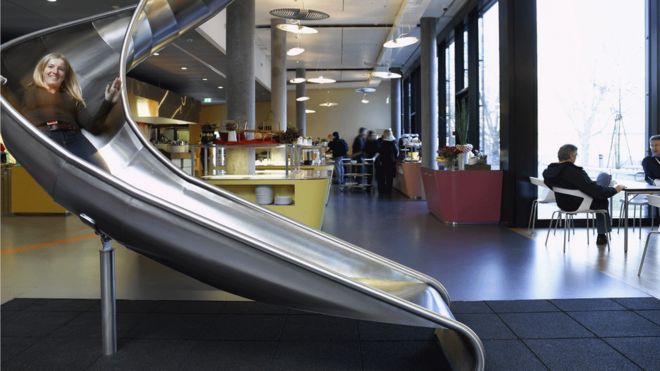 GOOGLE
GOOGLEWould a slide in the office persuade you into work? Google's headquarters in Zurich has a massage room, aquarium and a slide to deliver engineers smoothly and quickly to the canteen. 구글 쮜리히 본사에는 마사지룸, 수족관, 엔지니어들이 식당으로 스므스하고 빠르게 이동할 수 있는 미끄럼틀이 갖춰져 있음.
Deloitte's Amsterdam office was designed with one empty room on each floor for employees to put what they wanted in them - most have gone for games such as table football. 델로이트의 암스테르담 사무소에는 각 층마다 빈 사무실이 있어 여기서 직원들이 원하는 물건들, 예컨대 테이블 풋볼과 같은 게임도구들을 비치할 수 있게 하고 있다.
At LinkedIn's Californian HQ there is a music room, stocked with keyboards, drums, guitars and audio equipment. 린키드린의 캘리포니아 본사에는 키보드와 드럼과 오디어장비가 갖춰진 음악실이 있다.
And allowing employees to bring their pets to work is increasingly common.
So when did our offices turn into playgrounds, and does this represent the new way of working?
Technological advances mean that staff can avoid the drudgery of commuting and work from home, coffee shops, or any number of exotic locations. So some companies are working extra-hard to make their offices more attractive places to be.
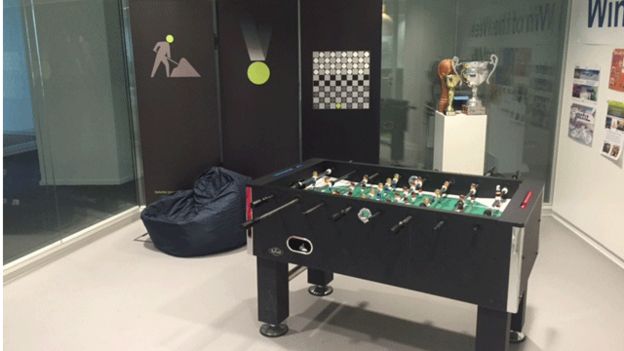 DELOITTE
DELOITTEAt Deloitte's Amsterdam headquarters, one room on each floor is left for employees to furnish A recent report from US software giant Citrix forecast that by 2017, some 50% of businesses would have a mobile working policy, and by 2020, 70% of people would work away from the office as often as they worked at a desk.
"Offices are expensive and office space will decline," says Citrix vice president Jacqueline de Rojas.
This is partly due to bosses realising not all jobs need to be done from an office, but also because employees are increasingly demanding a better work-life balance, she adds.
What did the "office of the future" look like in years gone by? That doesn't mean that the office will die, though.
"Offices will become places of collaboration and connection because culturally we need touch points as we are social animals," she says.
The 'super-desk'
Citrix has installed "genius benches" at its London headquarters - essentially higher and longer shared desks that come with stools, not chairs.
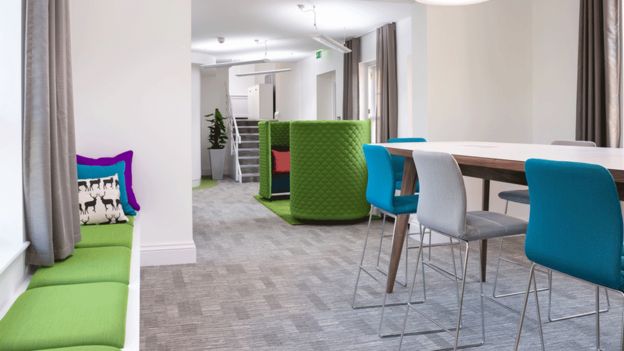 CITRIX
CITRIXHow about a slightly higher, less formal desk and chair - would that inspire you? There are also moveable desks, like the ones at headphone maker Skullcandy's office in Zurich. The desks can be configured to work individually or collaboratively, fitting together like puzzle pieces.
Meanwhile, marketing firm Barbarian Group has created a "super-desk" at its New York office which sits up to 170 people, and includes archways where staff can go for private chats.
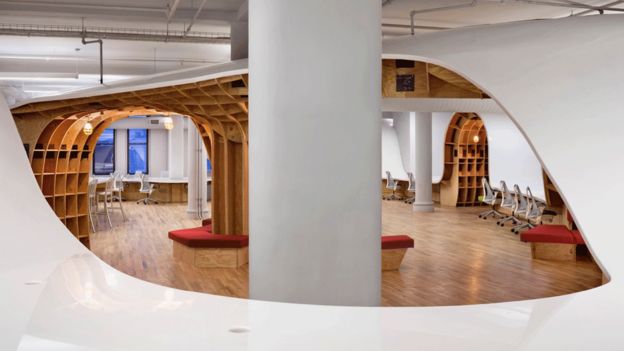 BARBARIAN GROUP
BARBARIAN GROUPBarbarian Group's "super-desk" includes archways for more informal seating And Lego has taken hot-desking to the next level at its London and Singapore offices, introducing a system called activity-based working, which means that no-one has a fixed desk any more.
More features about the Future of Work
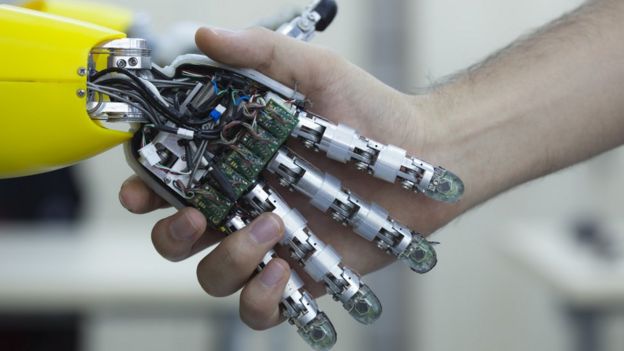 THINKSTOCK
THINKSTOCK- The digital nomads making the world their office
- How happy chatbots could become our new best friends
- How 'robo recruiters' could affect your job prospects
- How to check out your next penthouse from your armchair
- Is the 'gig economy' turning us all into freelancers?
- What jobs will flying robots be doing in future?
- How online 'influencers' are changing the food industry
Space is divided into flexible work zones with no fixed seating and no offices for managers. Employees who leave their workspace for more than one-and-a-half hours need to take all their stuff with them.
Lego even has a department for "new ways of working" and, says senior director Sophie Patrikios, the experiment has gone well.
"In our May 2016 survey, 88% of staff said they liked the choice of where to work. They get a choice of different settings to suit their activity or mood, including a quiet library, a buzzing social area with background music, comfy chairs in cosy corners or big banks of desks to share with team-mates," she says.
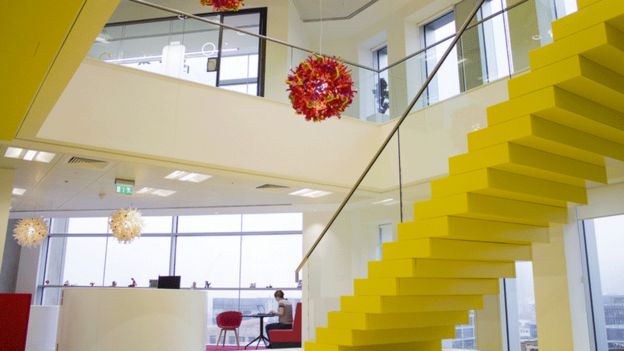 LEGO
LEGONomad in your own office? Lego employees in its London HQ have no assigned seating Offices are also getting smarter. Research firm Gartner says commercial buildings are already at the forefront of the "internet of things" revolution.
Smart lighting, heating, and even sensors that measure how many people are in an office, are becoming commonplace.
Healthier offices
Such technology plays a vital role in making buildings work more efficiently, but also raises questions about employee privacy and what happens to the data being collected.
More energy-efficient buildings can offer employee benefits too, says Theo Maessen, a senior partner at Dutch-based building design firm BOB (BOB stands for Best Office Building).
"We are building healthier offices that use more daylight, have systems that maintain a constant temperature that eliminates mould and dust, and therefore reduces the rate of illness among employees," he tells the BBC.
Using computer simulation, Mr Maessen can work out the optimum number of windows for a building - no more than 40% of it should be glass, apparently - as well as factors such as the ideal air flow.
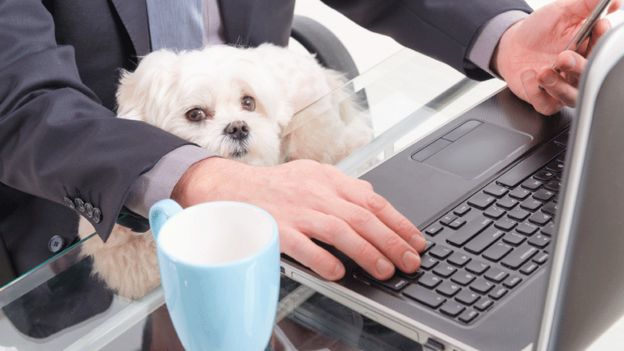 THINKSTOCK
THINKSTOCKA study from Virginia Commonwealth University suggests bringing dogs to work can reduce stress The buildings he designs have no air-conditioning, using instead a geothermal system that takes advantage of the constant temperatures found underground.
Warm water is pumped in over winter and cooler water during the summer months.
The company uses wood-fibre bricks that breathe better and, as they are made from by-products from saw mills, are also more environmentally-friendly than traditional bricks.
Occupants of his offices can use an online tool to provide feedback on their welfare and make complaints. Positive feedback has been "very high", Mr Maessen says.
Hot-desking will become standard, he says, and buildings will have to adapt to different uses.
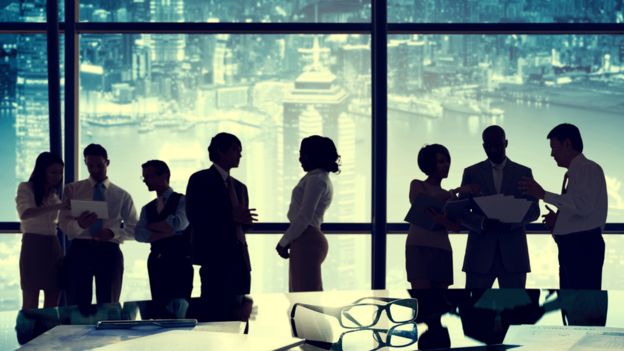 THINKSTOCK
THINKSTOCKWill the future of the office be more about group chats than individual work? "Over several decades, the occupancy will change. What was an office may become flats or retail space. Clients will also want to experiment with different configurations of their interiors," he says.
"In 20 years maybe we won't work a five-day week, it may be that we work just three days a week, and we have to try to design a building that can accommodate those changes."
In future, office spaces will also be closer to where people live, he believes.
 THINKSTOCK
THINKSTOCKIn future, work could be more about what we do, not where we are And communities will have communal office space that can be used by anyone, he predicts, cutting down on the need for travel.
Lego's Ms Patrikios agrees that big changes are on the way.
"We've already seen that work is no longer somewhere you go, but something you do," she says.
A greater shift towards flexible working and people having multiple part-time roles, rather than a job for life, will exacerbate the change.
In the future, "going to the office" will mean much more than just "going to work".
'아름다운 인생 > 비지니스' 카테고리의 다른 글
(비지니스) 패션과 SNS와 스마트폰의 만남 (1) 2016.06.24 (비지니스) 테크놀로지 중독은 직장생활에 불필요한 스트레스를 주는 것일까? (0) 2016.06.15 (비지니스) 중국 자국기업이 아프리카 잠비아에서 소고기 통조림에 인육 넣어 판 혐의 부인 (0) 2016.05.22 (비지니스) 美온라인운송업체 우베르社 무인자동차 기술개발에 뛰어들다 (0) 2016.05.21 (비지니스) 태양을 향해 운동하고 있는 수성 (0) 2016.05.10